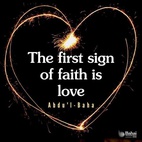The views expressed in our content reflect individual perspectives and do not represent the authoritative views of the Baha'i Faith.
I have felt blessed in recent years to spend time with extraordinary individuals – the wonderful souls gerontology now defines as “in the latter third of life.” You know – old people.
That terrific experience has made me wonder: why do some people automatically think of the word “old” as a bad thing? In many cultures around the world, age means wisdom, experience, respect, and maturity.
At that advanced time of life, those living through what we colloquially call “the golden years” often receive a big present disguised as distress – a whole new set of aches, pains, and maladies which bring on an acute awareness of physical limitations. As we age our bodies begin their inevitable deterioration – it happens to everyone – and we naturally start to wonder what comes next.
Sound depressing? It’s not at all, if you look at it from a Baha’i perspective – in fact, in his mystical book The Hidden Words, Baha’u’llah described death as “a messenger of joy:”
O Son of the Supreme! I have made death a messenger of joy to thee. Wherefore dost thou grieve? I made the light to shed on thee its splendor. Why dost thou veil thyself therefrom?
RELATED: How the Beauty of This World Helps Us Understand the Next
Spiritually, our time as elders can represent the most robust period of inner reflection, growth, and awareness. But mentally and emotionally we can also go the other way, by becoming hyper-focused on our mortality and who or what we will leave behind in this material world.
Many of us feel the urgency of making sure we have all of our earthly details in place, yet we also seem hesitant to think about and reflect on our own physical demise. Often it becomes even more difficult for us to bring our mortality up with our dearest loved ones. None of us knows when the moment of our inevitable passing will occur – but sooner or later, it arrives.
So: have you written a Will and Testament yet?
According to the Gallup Poll, less than half of American adults have written a will, despite that fact that we all need to. We all should have a will, not only to bequeath our possessions to others, and to avoid the legal complications that can ensue when we don’t – but so we can testify to our beliefs and make provisions that allow us to live life in this material world to the fullest, while also knowing that we leave peace of mind and direction for our families once we depart for the next world.
Why Baha’is Write Their Wills
The Baha’i teachings say that every adult Baha’i should have a written Will and Testament. In his Most Holy Book, Baha’u’llah wrote “Unto everyone hath been enjoined the writing of a will.” In that obligatory document, Abdu’l-Baha wrote, each person has the “full discretion to dispose of his property” as he or she sees fit:
… in truth, one is entirely free during his lifetime to make provision in his will for the division and distribution of his property amongst his heirs in whatsoever manner he seeth fit, in order that his wishes may then be implemented after he hath passed away. The writing of a will is obligatory upon everyone; everyone, that is, must in his lifetime draw up a will that is firm, sound, and clear in its provisions; seal and hide it; and guard it in a very safe place. In drawing up his will the testator enjoyeth full discretion to dispose of his property as he seeth fit; his will is a binding instrument, having precedence over any other provision, and no one hath the power to either modify or change it.
RELATED: 5 Ways to Prepare for the Next World
In order to fulfill our obligations as part of the human family, and to develop as spiritually healthy individuals within our own families and communities, most of us strive to integrate our physical, mental, and emotional life. Because death is a part of life, this needs to include, for every adult, what we wish for as we near the end of this physical existence.
Just as a will gives clear direction for the dispersion of our assets, end-of-life wishes, and so-called “living wills” or advance directives, it can also help us develop clear understanding and peace of mind with regards to how we want to spend the remainder of our time here on Earth.
Planning ahead with these kinds of details can seem difficult, especially when we are healthy or in our younger years, where we tend to think those decisions do not yet apply. As a result, we often postpone this conversation until a sudden illness or life change causes us to quickly make too-hasty decisions based on the emotion of the moment.
Just as everyone who draws breath must have a will and testament which we share with our loved ones, we are wise to document additional provisions for our wishes for medical care and treatment in the event that we can’t speak for ourselves. With prayer, meditation, and thoughtful consultation, we can embrace these important and personal decisions in open and heartfelt conversation with our loved ones.
In the next installment of this short series, we’ll explore what a well-thought-out will and testament might look like – and how you can prepare one yourself.
















Comments
Sign in or create an account
Continue with Googleor